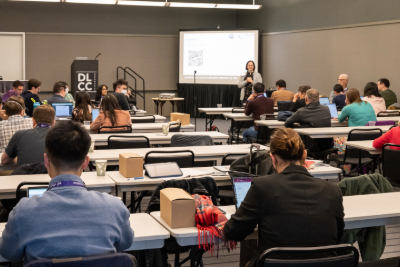Recent Awards and Funding for the NSF AccessComputing Community
NSF AccessComputing is lucky to have an amazing network of collaborators and partners. In recent months, our community has received multiple awards recognizing their contributions to the computing field and funding for future projects. Join us in celebrating this list of accomplishments:
- AccessComputing co-PI Stacy Branham of the University of California Irvine received the UCI Donald Bren School of Informatics and Computer Sciences, Dean’s Award for Service for the 2024/25 academic year.
- AccessComputing co-PI Stacy Branham was also recognized as a 2025 Irvine Game Changer. Stacy is redefining digital accessibility, ensuring that technology serves everyone, especially for people who are blind or have low vision. She develops assistive technologies like Jaime, a voice assistant that helps blind travelers in complex spaces, and ReadWithUs, an app that enables blind parents to read picture books with their children.
- NSF AccessComputing partner Stephanie Ludi, PhD, was named an ACM Distinguished Member. Stephanie is known for her work on accessibility, human–computer interaction, and computer science education. She is a professor of computer science and engineering and associate dean for Academic Affairs at the University of North Texas.
- Friend of NSF AccessComputing Cecilia Aragon, PhD—professor and director of the Human-Centered Data Science Lab at the University of Washington and co-founder and chief technology officer of Viata—has recently received two awards:
- She was recognized by the 2025 SIGCHI Special Recognition program, which celebrates and honors individuals who have made exceptional contributions to the field of human-computer interaction. Cecilia was recognized for "establishing human-centered data science as a new field bridging HCI and data science, demonstrating its impact through applications from astrophysics to energy systems.”
- She is the winner of the 2025 WEPAN Bevlee A. Watford Inclusive Excellence Award for actively and creatively supporting the success of women of color in engineering at the undergraduate, graduate, faculty, and/or administrative levels.
- Sarah Ciras, MS, an AccessCSforAll partner, received the Learning Disabilities Association’s Sam Kirk LDA Educator of the Year Award. Sarah is a Computer Science Teachers Association Equity Fellow and Special Educator at Landmark School. Sarah began teaching computer science to her special education students about seven years ago after a student approached her to learn about the topic.
- Gene Kim, an undergraduate NSF AccessComputing Team member, received the Computing Research Association’s prestigious Outstanding Undergraduate Research Award for 2025. The CRA Outstanding Undergraduate Researcher Award is meant to recognize and foster emerging talent and excellence in computing research. Gene already has more than 160 citations on Google Scholar and has six published papers and four posters to his credit at venues including ACM SIGCHI, ACM ASSETS and TACCESS.
- Gallaudet University assistant professor Abraham Glasser, an NSF AccessComputing Partner and former NSF AccessComputing Team member, is a co-recipient of a $4.625 million grant from the National Institute on Disability, Independent Living, and Rehabilitation Research (NIDILRR grant number 90REGE0027). The funding spans five years. Under this grant, Abraham will be co-director for the Deaf and Hard of Hearing Technology Rehabilitation Engineering Research Center (DHH-RERC), which addresses critical needs in immersive technology and artificial intelligence (AI) for deaf and hard of hearing people through research and development of novel technologies, advanced training and educational techniques, and dissemination strategies.
- Former NSF AccessComputing Team member Ather Sharif, PhD, is a 2025 recipient of the American Association of People with Disabilities (AAPD) Paul G. Hearne Emerging Leader Award. With the Hearne Award funds, Ather will enhance and scale his initiative, UnlockedMaps, an online map that assists users with mobility disabilities in making informed decisions regarding their commute.
- NSF AccessComputing partners Devorah Kletenik, PhD—professor of Computer and Information Science at Brooklyn College—and Rachel Adler, PhD— associate professor in the School of Information Sciences at the University of Illinois Urbana-Champaign—were recently awarded a SIGCSE Special Projects grant, Building an Inclusive Future: Teaching Accessibility to K-12 Teachers. This project will focus on building up and offering professional development for K-12 teachers about teaching accessibility.
- Devorah Klentenik was also awarded an NYC Tech Talent Pipeline grant, Breaking Barriers, Building Access: A Course Innovation for Inclusive Computing, which will create modules about accessibility that can be inserted into a range of computing courses at the City University of New York (CUNY).
- Former NSF AccessComputing Team member Elba Garza, PhD, and friend of NSF AccessComputing Miya Natsuhara, MS, both assistant teaching professors with the Paul G. Allen School of Computer Science & Engineering at the University of Washington, received the 2025 UW Distinguished Teaching Award as part of the Allen School’s CSE 121, 122 & 123 Launch Team.
Join us in congratulating our community members for their achievements!
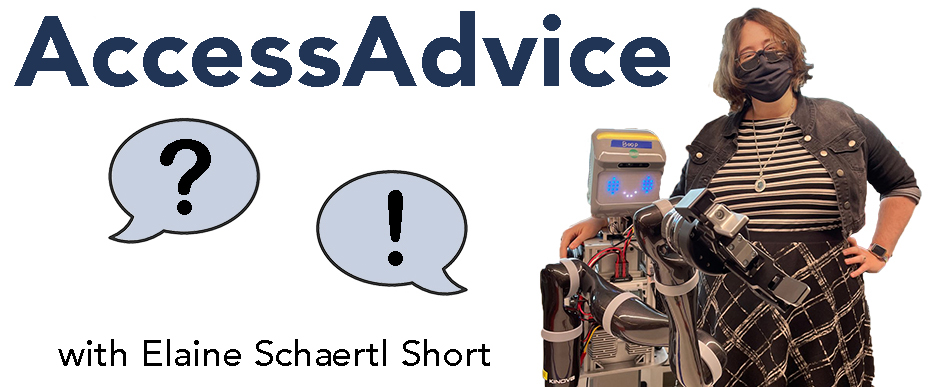
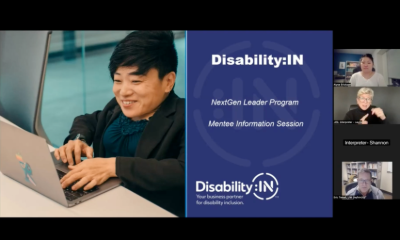 NSF AccessComputing staff have worked over the last six months to provide multiple webinars to the NSF AccessComputing community. We’ve got several recent resources focusing on student academics, leadership, and career development, and on faculty development. We also have quite a few resources designed to support computing faculty in advancing their teaching/learning knowledge to support students with disabilities in the classroom and the workplace. In addition, hearing from students and faculty alike that mental health concerns are on the rise, we provided a two-part series on mental health by academics for students, faculty, and staff.
NSF AccessComputing staff have worked over the last six months to provide multiple webinars to the NSF AccessComputing community. We’ve got several recent resources focusing on student academics, leadership, and career development, and on faculty development. We also have quite a few resources designed to support computing faculty in advancing their teaching/learning knowledge to support students with disabilities in the classroom and the workplace. In addition, hearing from students and faculty alike that mental health concerns are on the rise, we provided a two-part series on mental health by academics for students, faculty, and staff. The
The 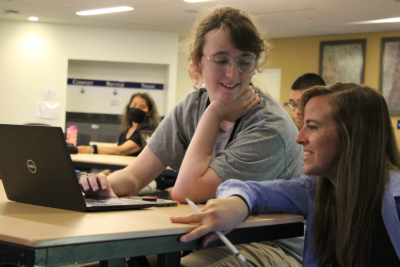 The DO-IT Center and NSF AccessComputing, in collaboration with the Paul G. Allen School of Computer Science and Engineering, have received funding from the Computing Research Association to establish AccessUR2PhD: Supporting Women and Gender Marginalized Students with Disabilities in Computing Research. AccessUR2PhD aims to increase the number of women and gender-marginalized individuals with disabilities (WGMD) on track to earn a PhD in a computing field with a focus on mentoring and community.
The DO-IT Center and NSF AccessComputing, in collaboration with the Paul G. Allen School of Computer Science and Engineering, have received funding from the Computing Research Association to establish AccessUR2PhD: Supporting Women and Gender Marginalized Students with Disabilities in Computing Research. AccessUR2PhD aims to increase the number of women and gender-marginalized individuals with disabilities (WGMD) on track to earn a PhD in a computing field with a focus on mentoring and community.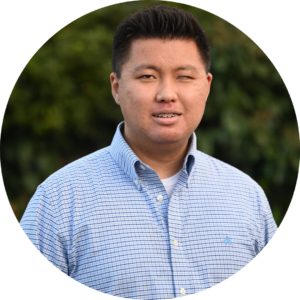 NSF AccessComputing Team member Gene Kim has received the
NSF AccessComputing Team member Gene Kim has received the 